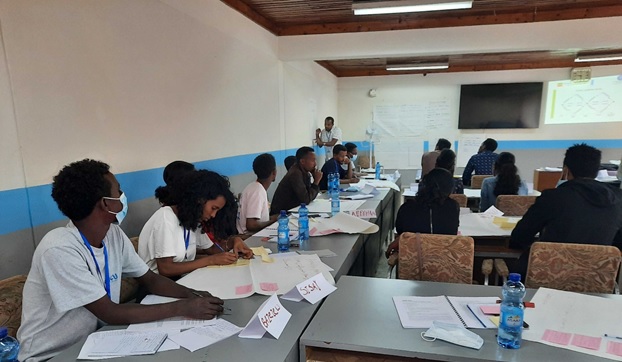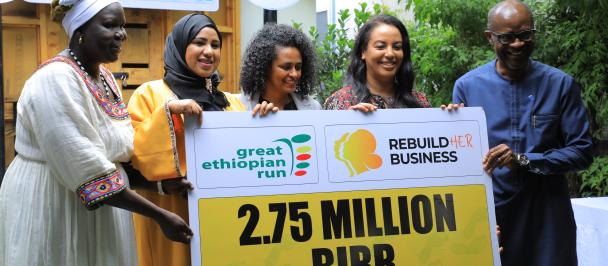Lidiya Solomon is passionate about making mental health services accessible for urban youth and fighting against the stigma of seeking help. She founded her pioneer digital platform LSSAY that gives access to affordable and convenient virtual connections to the mental health profession in Ethiopia. She has successfully piloted her idea through social platforms for a year and is now looking to launch a website and expand her reach in the untapped market.
Lidiya is one of the young people starting their entrepreneurship journeys all over the country, shaping their futures and changing society. So, where do they turn to get support navigating the road from idea to a business, and how might we, at UNDP, help create an ecosystem today that can help build an equitable, sustainable, and prosperous future for all.
Building an economy that is open to doing business, inclusive to all and have stable employment needs an entrepreneurship ecosystem that can innovate and meet the changing demands of the market through technology and beyond. UNDP's innovation-for-development project, through the generous donation of Korea International Cooperation Agency KOICA, is strengthening the capacity of the startups and SMEs, creating better institutional coordination between ecosystem actors and facilitating access to finance. Specifically, we are working with start-ups and SMEs in ICT to be more productive and contribute to employment by providing tailored mentorship and training, global experience sharing opportunities and creating knowledge hubs for information regarding innovation and research regulation, training, and funding.
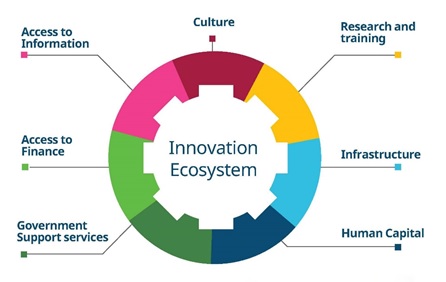
Simplified innovation ecosystem
#ETdeeds 2021
To identify startups with growth potential within the ICT sector, we launched the #ETdeeds competition. In the first
round, 138 applications were received through the online application portal from all over the country. After three rounds of screening, evaluation by a technical committee and pitching sessions, ten startups and SMEs were identified as the first cohort finalist. The finalists have received tailored mentorship and participated in an incubation program, and accessed finance through a credit guarantee scheme upon completion of the program and investment readiness. In addition, the project is also holding a 15 boot camp where 200 entrepreneurs will have the opportunity to develop and prototype their ideas, participate in pitching sessions and come out with business plans and seed funding.
Working closely with entrepreneurs and the ecosystem actors such as universities and training institutions, we have seen some patterns on what startups want more knowledge about and get information on. Here are some areas that we have seen as being of interest to them when it comes to capacity development.
Building partnerships
The road to innovating and entrepreneurship needs support through collaboration and partnership. We see this at the ecosystem level between different actors such as government, academia, and the private sector, but it is also true in building a start-up. We often hear people ask how to connect with others on ideas and build valuable partnerships. There is also fear of others adopting or 'stealing' new and innovative ideas, meaning that entrepreneurs are reserved about reaching to others for collaborations. There is also a question on trademarking, copyright and intellectual property that could offer legal protection. Overall, legal consulting services could benefit from more business development training. Information can also be accessible through the Intellectual property office website and our innovation and entrepreneurship platform.
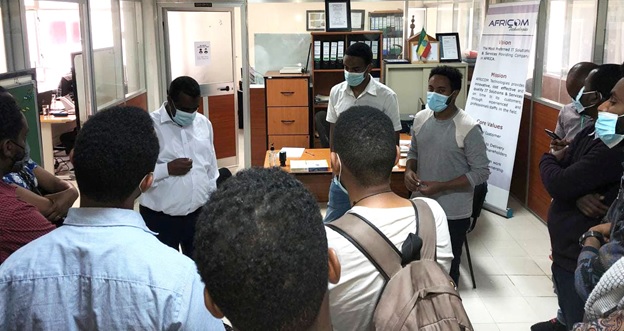
Entreprenurs visit to ICT park
Capitalize on failure
There is a lot of trial and error in an entrepreneur’s journey, with the threat of failure and uncertainty can be a constant one. The fear of failure can also determine how entrepreneurs set their goals and take action both in either a positive or negative way. The key is seeing failure as a learning opportunity and seeing learning as a way to mitigate failure to some extent. Therefore, it is important to create networks that address success and normalize failure through mentorship and support. We have seen the appetite from entrepreneurs to learn more about what others have learned from their practical mistakes. The UNDP accelerator lab explored how we can cultivate a mentality of failure as a driver for motivation rather than something to avoid at all costs. In collaboration with the lab, we want to hold networking events centred on exploring failure opportunities to address some of these needs.
Valuation and pitching of ideas
Once an entrepreneur has an idea validated, it should be effectively communicated to attract investment. That means entrepreneurs need ample practice in verbal and written communication of ideas. Specifically, when it comes to investment readiness, they also need to evaluate their ideas as an asset and request fair and acceptable terms from investment partners. So, while we are providing opportunities, such as innovation competitions, we also need to create formal and informal opportunities of practice for entrepreneurs to enhance their communication skills. One-time incubation or training may not be sufficient in such cases. Therefore, entrepreneurs are asking for more opportunities to practice pitching for example, before they participate in a competition. One approach we are exploring is designing boot camps that lead to competitions, rather than only doing open calls that lead to incubation opportunities. By having training opportunities beforehand, we can explore if we can better evaluate well-articulated ideas.
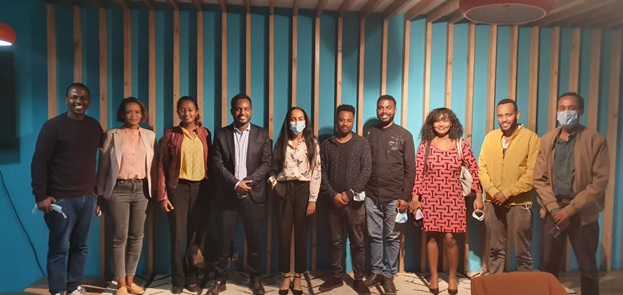
#ETdeeds networking event
What is Next
The innovation for development will be working on strengthening the innovation ecosystem for the next four years for a sustainable impact on the capacity of ecosystem actors, providing support to start-ups and better coordination and collaboration across the actors. We are expanding our reach to universities and centres to create market-driven innovation for industry and creating national frameworks for supporting innovation and entrepreneurship. As we move forward on this journey, we look forward to sharing key learnings and insights about the ecosystem and what it takes to make it inclusive.

 Locations
Locations